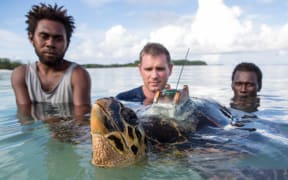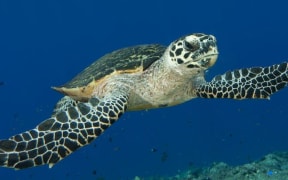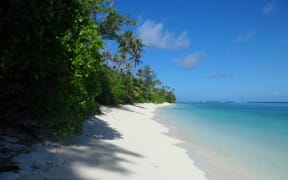A critically endangered hawksbill turtle is being nursed back to health after being found washed up on Northland's 90 Mile Beach earlier this month.
It was exhausted, dehydrated, not eating and missing a flipper.
While the cause of the amputated flipper was not known, it appeared to be an older wound that had healed well.
Auckland Zoo resident vet Lydia Uddstrom said the turtle had eaten at least one piece of plastic, and it was unclear how much more it might have inside it.
"Some time in his journeys through the ocean he'd obviously eaten plastic and thankfully that little piece managed to make its way all the way through his body and come out the other end, but it's one of those really scary threats that these guys face out in the wild that there is a lot of plastic out there."
Plastic was an ongoing concern for marine animals, she said.
"We're getting more and more plastic out there and we're going to be getting more and more effects from it, and from animals that shouldn't be eating it, eating it."
Ms Uddstrom said reducing the use of the material and disposing of it safely was critical for the survival of turtles in particular.
Auckland Zoo provided initial urgent medical attention before the turtle was taken to the Kelly Tarlton's Sea Life rehabilitation centre.
While green turtles tend to make up the bulk of the strandings in New Zealand, Kelly Tarlton's fish department team leader Joe Woolcott said they were brought one or two hawksbill turtles each year.
"It's always a worrying thing when they turn up, there's a number of different issues which they can be facing in the wild.
"For a start the natural environment is a hard life for any wild creature but of course all the increased pressures from human-based degradation of the environment. You've got plastic rubbish which they can ingest, pollution, destruction of their nesting habitats in other parts of the world."
He said the turtle was showing encouraging signs of improvement after its check-up today.
"It is still a buoyant turtle, so it's got air underneath its shell, which means it floats up to the surface of the water and it can actually expend a lot of energy trying to swim back down. It's still in a situation where it needs care to get over that issue."
Once the turtle's strength had improved, it would be moved to a larger oceanarium to exercise and go about its natural behaviour with the goal of releasing it back into the wild.
Mr Woolcott said it could be more than a year before it was ready to be released.
"We're hoping we're doing our little piece of the puzzle to help the welfare and ongoing improvement of this species as a whole."
Traditionally local iwi give turtles that wash ashore in New Zealand their names, which has not happened yet. Its gender was not yet known as its shell made determining that a challenge.
Today marks World Turtle Day, which aims to increase attention and public support for their survival.




